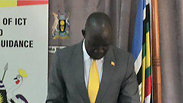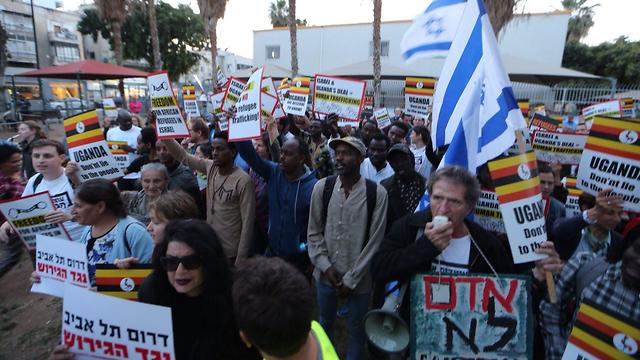
Musa Ecweru
Uganda 'considering' Israel's request to take 500 migrants
Uganda is considering a request from Israel to take in 500 migrants from Eritrea and Sudan, a minister says, the first time the East African nation has acknowledged it is in talks over such a deal; minister adds his country will only take in people who leave Israel willingly.
Uganda is "positively considering" Israel's request to take 500 Eritrean or Sudanese migrants rejected by Israel, a senior government official said Friday, the first official confirmation of an agreement to receive African migrants whose planned deportations have caused widespread protests in Israel.
The migrants will be thoroughly evaluated by Ugandan officials before receiving asylum in this East African country, Musa Ecweru, the government minister in charge of refugees, said in a statement.
"My work is to manage refugees that have accepted to relocate to a third-party country. And Uganda accepted the 500 refugees from Israel and this is not a problem to Uganda," Ecweru said. "We already have millions of refugees in Uganda from Somalia and Ethiopia so the few from Israel won’t be a problem to Uganda as a third-party country."
Ecweru said "all refugees world over" should be "voluntarily repatriated with strict observance and adherence to international law," but did not give further details on the possible deal.
Official documents submitted to the Israeli Supreme Court on Tuesday said authorities have identified close to 8,000 Eritrean and Sudanese migrants it would potentially deport under a compulsory expulsion plan.
When asked about the discrepancy, Ecweru though told Reuters the deal under discussion with Israel covered only 500 refugees.
The minister also denied that Uganda would receive payment for taking in said refugees.
"The people saying on social media that countries give us money whenever we accept refugees to come in is false," he said. "In fact, we are the ones who spend on these refugees."
Uganda's government has previously denied reports of a deal with Israel to accept the deported migrants. According to the Israeli government, 630 African migrants "voluntarily left" to Uganda in 2017 alone.
"To my knowledge, no refugees from Israel have come in yet," Ecweru said. "If they are here, they are trespassers."
Israel considers most of the 35,000 migrants to be job seekers and says it has no legal obligation to keep them. The Africans say they face danger if they return home.
A wide coalition of critics in Israel and in the Jewish American community had called the government's deportation plans unethical and a stain on Israel's image as a refuge for Jewish migrants. Several mass protests against it have taken place in recent months.
Earlier this month Israeli Prime Minister Benjamin Netanyahu nixed his own deal with the United Nations in which roughly half of the migrants living in Israel would have been resettled in the West and others absorbed in Israel. Netanyahu cancelled the plan after facing heavy criticism among nationalists within his own ruling coalition.
Nearly all the migrants hail from Sudan and Eritrea, countries with poor human rights records. The Africans started arriving in 2005, after neighboring Egypt violently quashed a refugee demonstration and word spread of safety and job opportunities in Israel.
Tens of thousands crossed the porous desert border before Israel completed a barrier in 2012 that stopped the influx. Israel has struggled with what to do with those already in the country, alternating between plans to jail and deport them and allowing them to work in menial jobs.
Thousands have concentrated in poor neighborhoods in south Tel Aviv, an area that has become known as "Little Africa." Their presence has sparked tensions with working-class Jewish residents, who have complained of rising crime and pressed the government to take action.












